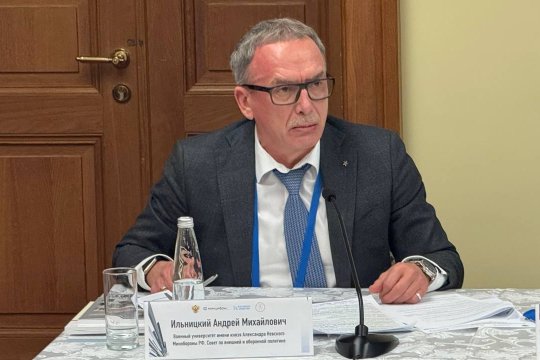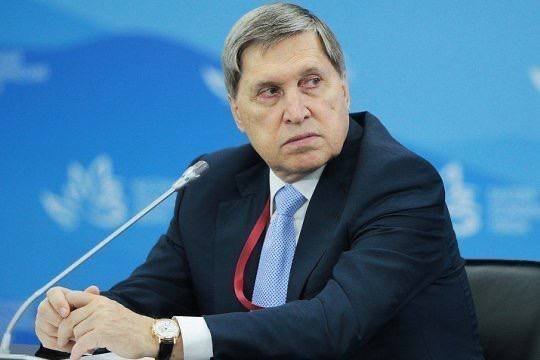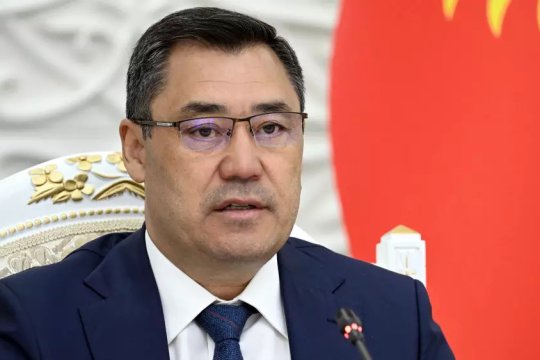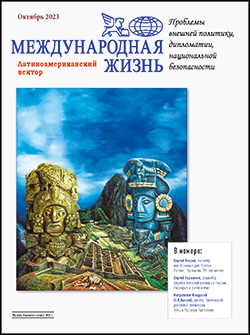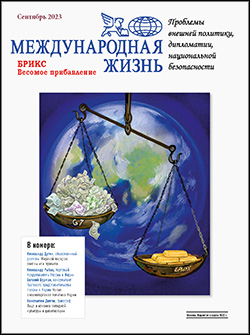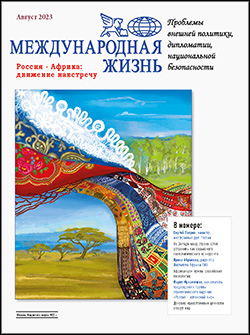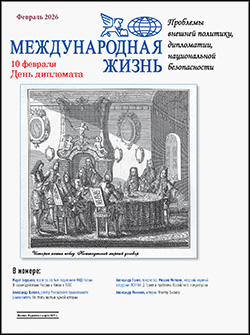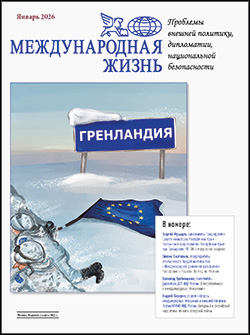Diplomacy
![]() Our Mission is to Strengthen the Dialog Between Central America and Russia
Our Mission is to Strengthen the Dialog Between Central America and Russia
Hugo Roger Martinez Bonilla, Minister of Foreign Affairs of the Republic of El Salvador
Speaking of the bilateral relations, Russia and El Salvador have defined the priorities in their cooperation so as to build on the existing potential. The two countries are discussing approaches to boosting trade, widening tourist exchanges between Russia and El Salvador, and attracting Russian investments to El Salvador's economy.
El Salvador currently considers opening an embassy in Moscow. The issues, including their organizational and financial aspects, are being examined by a team formed for the purpose. El Salvador's minister said he hoped that the interactions would gain momentum and that, by the time Russia and El Salvador celebrate the 20th anniversary of their diplomatic relations, the embassy will hopefully be in place.
Keywords: relations between Russia and El Salvador, Russia – Central America Dialog, Central American Integration System, the Organization of American States, president Carlos Mauricio Funes Cartagena
![]() The Comprehensive Nuclear-Test-Ban Treaty: on the Way to Nonproliferation
The Comprehensive Nuclear-Test-Ban Treaty: on the Way to Nonproliferation
Tibor Toth, Executive Secretary of the Preparatory Commission for the Comprehensive Test Ban Treaty Organization
The efforts made by the Preparatory Commission for the Comprehensive Test Ban Treaty Organization complement the work carried out by the IAEA. The agency's objective is to prevent misuse of nuclear technologies, facilities, and materials. The Commission collects evidence of the cases where – despite the IAEA endeavors - the task remains unaccomplished and any countries attempt to test weapons based on fission technologies. The Comprehensive Nuclear-Test-Ban Treaty is an integral part of a wider nonproliferation regime. In financial terms, the Commission's budget is comparable in size to that the IAEA allocates annually to maintain its guarantees.
Keywords: The Comprehensive Nuclear-Test-Ban Treaty, IAEA, the Preparatory Commission for the Comprehensive Test Ban Treaty Organization
![]() 55 Years of Friendship and Cooperation
55 Years of Friendship and Cooperation
Tkhai Vanna, Ambassador Extraordinary and Plenipotentiary of the Kingdom of Cambodia to the Russian Federation
The people and the government of Cambodia will never forget Russia's assistance to Cambodia – in the form of humanitarian, financial, and technical aid – which helped the country recover in the wake of the devastating rule of the Khmer Rouge.
Cambodia is keenly interested in new approaches that would re-energize its cooperation with Russia. I am convinced that the cooperation between Cambodia and Russia should widen in all directions, paving way for deeper understanding and engagement between our peoples.
Keywords: the Kingdom of Cambodia, 55th anniversary of the diplomatic relations between Russia and Cambodia, ASEAN
![]() 90th Anniversary of the Cryptographic Service of the Russian Federation' Foreign Ministry
90th Anniversary of the Cryptographic Service of the Russian Federation' Foreign Ministry
N. Abramov
May 5, 1921 is set as the founding date of Russia's nationwide Cryptographic Service, though in fact it existed in various forms for centuries alongside the Russian statehood. Russia assembled its first staff of cryptographers in 1549 in the process of creating its ministry of embassies which used to be in charge of Russia's foreign politics.
Keywords: cryptographic service, field division of the ministry of embassies, office of encryption, cryptographic department, 10th Department of the People's Commissariat for Foreign Affairs
Moscow Diplomatic Corps
![]() Open Dialog Between the US Ambassador and his Russian Audience
Open Dialog Between the US Ambassador and his Russian Audience
John Beyrle, US Ambassador Extraordinary and Plenipotentiary to the Russian Federation
Back in the XIX century, Russia and the US used to maintain pragmatic and mutually rewarding relations based on the two countries' common interests. This is exactly the type of relations that deserve to be extended into the future, and a lot has been accomplished in this regard over the past years. Russia and the US plan to strengthen the economic ties beneficial for both countries as they would help to boost trade and investments, create jobs, and expedite innovations.
Keywords: bilateral presidential commission, the Skolkovo project, Silicon Valley
Editor's Column
![]() Gone with the Dream
Gone with the Dream
Armen Oganesyan, Editor-in-Chief, International Affairs
The bloodiest war in the US history commenced 150 years ago. The Civil War between America's North and South took 620,000 lives, roughly as many as the US lost in all other wars combined. The statistics showing that in today's US two thirds of Americans count on their family records ancestors who had to take part in the Civil War serves to dispel the myth that the US owes its current grandeur to subsequent tides of immigration.
The Arab Direction
![]() The First Revolutions of the XXI Century
The First Revolutions of the XXI Century
A. Orlov
The phenomenon that surfaced recently across an array of Arab countries is described in classic theories of revolution as a radical aggravation of economic hardships suffered by the disadvantaged strata. In the above cases, the shares of the populations to be regarded as disadvantaged evidently amounted to the majority. Present-day capitalism is known to massively breed social inequality. Under normal circumstances, the paradigm found essentially in all capitalist countries may be less visible in the industrialized world, but the global economic crisis nevertheless highlighted the trend.
Keywords: crisis in the Middle East and in North Africa, Usama Bin Laden, social injustice, radical Islamist groups
![]() Libya and the Theme of National Sovereignty
Libya and the Theme of National Sovereignty
V. Kuznechevsky
The March and April outbreaks of popular unrest in North Africa and the Middle East, especially the developments in the Great Socialist People's Libyan Arab Jamahiriya, put into the spotlight the UN role in resolving international conflicts. Discussions, including those in the UN Security Council, revolved around the acceptable measure of the international community's intervention into the domestic politics of a sovereign country, or, from a wider perspective, around the viability of national sovereignty in today's world.
Keywords: Libyan Arab Jamahiriya, national sovereignty, the Westphalian system, international law, Libya, UN Security Council
![]() Arab Revolutions: Spontaneous Regime Change or Chaos Control?
Arab Revolutions: Spontaneous Regime Change or Chaos Control?
A. Manoylo
Any edition of what became known as the color revolution is an implementation of the technology of international conflict management based on media manipulation, and as such has to be artificially set in motion. Societies in formerly stable and predictable North African countries sank into exactly this type of engineered conflicts as a result of externally applied chaos control efforts.
Keywords: color revolutions in the Middle East and in North Africa, chaos control
![]() Sarkozy vs. Gadhafi
Sarkozy vs. Gadhafi
T. Zvereva
Paris was the first to grant official recognition to Libyan rebels, pressed for UN Security Council Resolution 1973 which de fact greenlighted the military intervention into Libya's domestic conflict, and contributed key efforts to the formation of the coalition of the willing, an ensemble of countries which subjected Gadhafi's Libya to air strikes. What could be the reasons behind the French departure from its traditional restraint concerning the use of force?
Keywords: unrest in the Arab world, military conflict in Libya, French policies in the Mediterranean region, reasons behind the French pro-active position over Libya
The World Around US
![]() BRICs as a Driver of Multipolar World Formation
BRICs as a Driver of Multipolar World Formation
V. Davydov
The rise of the community – initially as BRIC and currently as BRICs – showed that, leaving behind rounds of consensus-searching and convincingly disproving the arguments set forth by skeptics, BRICs countries are saturating the organization with practical initiatives.
Keywords: BRICS, the BRICs countries’ Hainan summit, multipolar world
![]() The BRICs Networking Diplomacy
The BRICs Networking Diplomacy
S. Filatov
It became clear several years ago that the community's countries would successfully parlay their impressive economic might into political weight, the results being the emergence of a new economic elite and the taming of the influence exercised by the world's Golden Billion
Keywords: BRICS, the BRICs countries’ Hainan summit, Goldman Sachs, network technologies, BRICs position on Libya
![]() BRICs Propping Up Images of New Players?
BRICs Propping Up Images of New Players?
I. Antonov
No doubt, the recent BRICs Hainan summit was the year's highlight for the Chinese diplomacy, comparable in importance only to the tour of the US by Hu Jintao. In both cases, part of Beijing's agenda was to unveil its renovated foreign-politics course.
Keywords: BRIC Hainan summit, China's new foreign-politics course, agreements on national-currency transactions in international trade, directions of cooperation advancement
![]() Earthquakes in Japan and the World Economy
Earthquakes in Japan and the World Economy
V. Nesterov
These days, only experts seem to recall that the 1995 Koba earthquake was at the time the costliest in Japan's history, with the death toll reaching 6,000, the damages topping $132b, and the Japanese economy shedding 2% of its value. The disaster that hit Japan recently was enormously severer and will likely have unprecedentedly dire consequences.
Keywords: earthquake in Japan, Fukushima, nuclear power plant, Japanese economy, Japan's GDP, economic damage
![]() European Energy in the Wake of Fukushima
European Energy in the Wake of Fukushima
N. Maden
The catastrophe in Japan ignited debates over the optimal mode of development for the EU energy sector. In the meantime, the European Commission is putting together a document detailing the EU energy policies up to 2050 which, by factoring into Europe's general strategy, will inevitably affect Russia
Keywords: the Hokkaido incident, Fukushima, the German Institute for Economic Research
![]() Fukushima: the Deception Technologies
Fukushima: the Deception Technologies
V. Kovalev
Nuclear energy, if properly handled, is absolutely safe and reliable. This, however, was not the case in Japan where a nuclear plant was built in a zone of heightened seismic activity and right on the coast, with total neglect for the risk of a tsunami
Keywords: Fukushima 1 and Fukushima 2 nuclear power plants, accidental cooling system, zone of anomalous seismic activity, geophysical disaster, spent nuclear fuel storage
Russian World
![]() Loving Russia
Loving Russia
E. Meyendorff
Baroness Elena N. Meyendorff represents an ancient kinship with a long record of glorious service to Russia. Living in Austria, she – like her prominent ancestors – is glorifying Russia
Keywords: Salzburg Russian culture center, Baroness Elena N. Meyendorff, 17 years of charity, Russian emigration
![]() Russian Church in Old Havana
Russian Church in Old Havana
A. Moiseev
The first Russian church in Cuba and the whole Caribbean – the Our Lady of Kazan cathedral – is a landmark of old Havana
Keywords: Our Lady of Kazan cathedral in Havana, Department for external church relations of the Moscow Patriarchate, Russian Orthodox Church, Patriarch Kirill of Moscow and All Russia, the Sretensky Monastery
Bookshelf
![]() The End of US Hegemony in South America?
The End of US Hegemony in South America?
A. Davydenko
A review of a paper by Joao Fabio Bertonha published in Negocios Estrangeiros, a journal of the Portuguese Diplomatic Institute of the Ministry of Foreign Affairs of Portugal
Keywords: hegemony, South America, US, Brazil, China, EU, Russia
![]() Rhythms of the Ecosystem of France's Fifth Republic
Rhythms of the Ecosystem of France's Fifth Republic
G. Kaninskaya
On Comprendre la 5ème République, edited by Jean-François Sirinelli, J. Garrigues et S. Guillaume
Keywords: the three glorious decades, Comprendre la 5ème République
![]() Poland and Russia: Jointly En Route to a New Europe
Poland and Russia: Jointly En Route to a New Europe
V. Gulevich
A review of To New Europe. Prospects for the Relations Between the EU and Russia by Director of the Częstochowa Institute of Geopolitics Leszek Sykulski
Keywords: Poland, Russia, Europe, US, continental bloc concept
![]() Life in Art. The Pertsov House in Kursov Lane
Life in Art. The Pertsov House in Kursov Lane
Keywords: The Pertsov House in Kursov Lane, S. Malyutin, the “Bat” cabaret
Читайте другие материалы журнала «Международная жизнь» на нашем канале Яндекс.Дзен.
Подписывайтесь на наш Telegram – канал: https://t.me/interaffairs

 00:00 13.07.2011 •
00:00 13.07.2011 • 